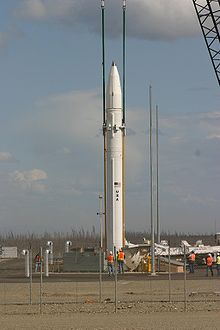Ground-Based Interceptor
| Ground-Based Interceptor | |
|---|---|

A Ground-Based Interceptor loaded into a silo at Fort Greely, Alaska, in July 2004
|
|
| Type | Anti-ballistic missile |
| Place of origin | United States |
| Service history | |
| Used by | United States Army |
| Production history | |
| Manufacturer | Orbital Sciences Corporation, Raytheon, Boeing Defense, Space & Security |
| Specifications | |
| Weight | 21,600 kg |
| Length | 16.61 m |
| Diameter | 1.28 m |
|
|
|
| Propellant | solid-fuel |
The Ground-Based Interceptor is the anti-ballistic missile component of the United States' Ground-Based Midcourse Defense (GMD) system. This interceptor is made up of a boost vehicle, constructed by Orbital Sciences Corporation, and an Exoatmospheric Kill Vehicle, built by Raytheon. Integration of these is performed by Boeing Defense, Space & Security.
The boost vehicle uses the solid-fuel rocket upper stages of the Taurus launcher. The interceptor version deployed in the U.S. has three stages. A two-stage version was successfully tested in 2010 for use in Europe's NATO missile defence as a backup option to the preferred Aegis System Standard Missile 3.
A total of 30 interceptors were deployed at the end of 2010 at Fort Greely, Alaska and Vandenberg Air Force Base in California. Fourteen additional missiles are planned by the end of 2017. Since 2006, the Missile Defense Agency conducted seven intercept tests with the operationally configured missile, four of which were successful.
...
Wikipedia
